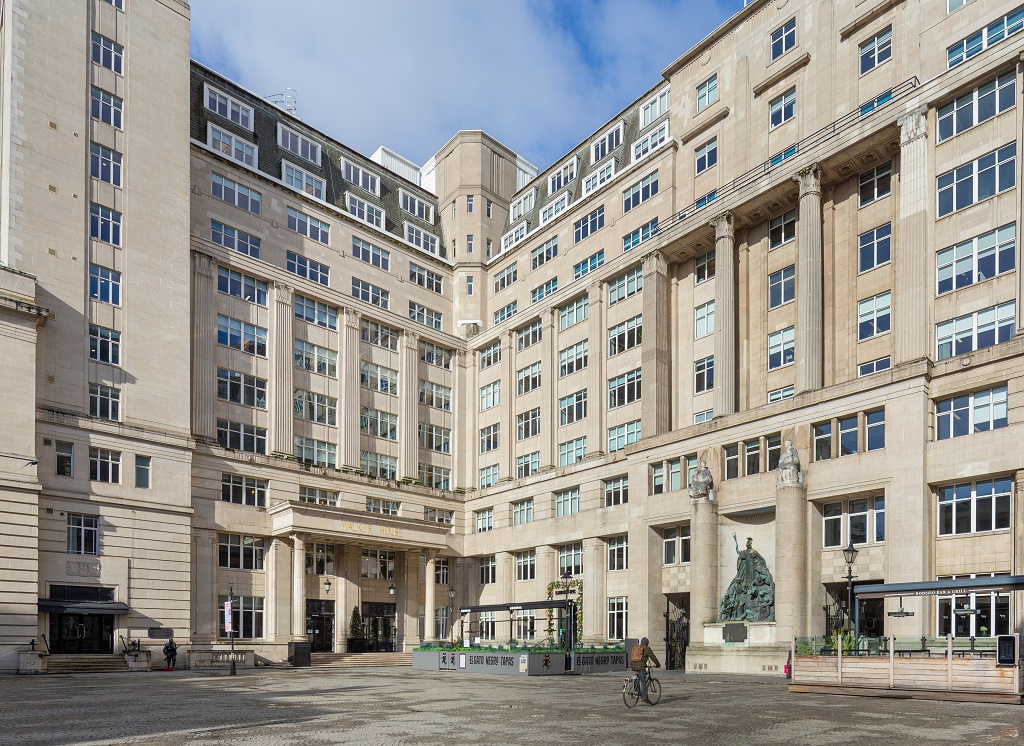The Subplot
The Subplot | ‘Fiscal event’, Liverpool offices, big money
THIS WEEK
- Fiscal event: doubloons for everyone, or will the new government fumble?
- Elevator pitch: your weekly rundown of who and what is going up, and who is heading the other way

TREASURE ISLAND
You say ‘fiscal event’, I say ‘mini budget’
Wednesday next week could see the cost-of-living “fiscal event” promised by new Prime Minister Liz Truss. What should the North West and its property market be listening out for?
Chancellor of the exchequer Kwasi Kwarteng has a very narrow window of opportunity to deliver the “fiscal event” that will explain how Truss’s plan to cap energy costs will actually work. The smart money is on Wednesday. Clearly the energy issue is meat in this budgetary sandwich, with average household bills frozen at £2,500 and businesses offered six months of less generous and more conditional support. But there will be plenty of consequences for property.
Not just households
What happens to business fuel bills? It’s all fine and dandy capping consumer costs, but if the local shop or pub or cinema or, for that matter, white collar business has energy-price related cash flow problems, then it’s not much consolation. A poll of Big Minds organised by Reuters suggested the Bank of England is about to hike interest rates by another 0.5%, which won’t help the maths work in leveraged businesses.
High street chills
By far the biggest risk is in the retail sector where margins are thin, spending is down, Covid is not forgotten, pandemic-related rent-free debts not yet resolved, leverage is high, and business rates are looking like a monster headache. In other words, the high street is in no position to cope with what’s coming.
Boring but bonkers
The business rates element is particularly painful and the easiest to quantify. According to Colliers, businesses face an unexpected £1.65bn rise in rates bills from April 2023 at exactly the point when they expected them to fall. Thanks to the way downward transitional relief works, a 20% drop in the value of retail rents should have produced a nice happy drop in rates bills. But, by factoring in some middle-of-the-road inflation predictions, Colliers estimates that the phased downward relief actually means they’ll pay £1.65bn more next year than they do today. This is obviously bonkers and will certainly cause business failures if the chancellor does not act…
…and he won’t
Or so says Gerald Eve’s business rates policy lead Jerry Schurder. “I’m not optimistic we’ll hear much if anything from this fiscal event. And even if we do it won’t affect the bills in the remaining six months of 2022/23,” he says. That leaves businesses facing large, historic rates bills at a time when existing costs are rising. But it gets worse. “It would be good to hear that they won’t be index linking the 2023/24 rates bill to inflation, because September’s CPI inflation figure is the one they use. A 10% rise in business rates due to inflation would be a huge risk to businesses, and critical to the chances of survival,” he says. Alas, having frozen business rates for a few years, the chances are the government thinks it’s done enough.
And offices?
Some keep-the-spirits-up whistling in the wind comes for Avison Young chief economist Nick Axford. His hope is that the high cost of heating the home, and rising concerns about job security, will nudge office workers back behind workplace desks. Being visibly “at work” will become important – and quite cosy. On the other hand, as Axford correctly notes, the risk of power blackouts for commercial users is higher than for domestic, so this cuts both ways.
Exchange rates
A collapse in the already wobbly value of Sterling could also be an outcome to watch. If Kwarteng borrows heavily – and we’re looking at as much as £100bn extra debt – then that devalues the pound against other currencies (more pounds in the economy, divided between the same amount of economic output, equals less value per pound). That makes buying UK real estate cheaper, so perhaps we’ll see US and European investors prowling the streets of Manchester? If so, some distressed landlords and moment-grabbing vendors will be pleased, but the overall economic impact is minimal or perhaps negative. However, as Axford says, for this to work investors need to think the Sterling will bob back up again some time soon, and the jury is out on that one because…
The numbers
The Institute of Chartered Accountants has a nice graphic that shows the problem, and you can take a look here. Ending £84bn of Covid relief measures and swapping some of it for £30bn of extra goodies was meant to cut the deficit on the coming year’s budget by £50bn, more or less. Economic growth was expected to do some heavy lifting, too. Today, economic growth seems unlikely in the short term – doubtful in the medium term – and that screws up the sums as does inflation (the government’s bills go up). Adding another £100bn to the debt side to pay your fuel bill makes this into something extraordinarily difficult. Extra borrowing won’t help inflation, either.
And levelling up?
The prospects for levelling up look rocky (Subplot, 8 September). The Centre for Cities has made a brave attempt to explain how regional investment could meet all of Truss’s economic objectives but it’s not clear anyone is listening. The government is about to bet the farm on a great gamble: that borrowing a ton of money to keep consumers happy, and cutting their taxes a bit, whilst not doing much to cushion business, will get the economy going (or surviving), despite the obvious and enormous inflation and exchange rate risks.
If it the gamble doesn’t work – and, honestly, the chances are slim – then even the beefiest levelling up can do nothing much to help.
 ELEVATOR PITCH
ELEVATOR PITCH
Going up, or going down? This week’s movers
Is that grinding sound the noise of Liverpool’s office market about to go up a few floors?
 Liverpool offices
Liverpool offices
Overnight a promised announcement landed from Liverpool City Council about a “major development project”. What could it be? It would have put smiles on a lot of faces if this was Kier Property and CTP’s long-delayed 400,000 sq ft Pall Mall office scheme. A gesture of support, or, better still, a wraparound lease from the council, would have kickstarted the £200m project and in the process injected some faith into an office market (and white collar economy) that looks worse than anaemic. As it turned out, the news was of another even-longer-stalled project, the council saying it will be going back out to market in the search for a developer for Festival Gardens.
Earlier in the life of the Pall Mall project, senior city council folk let it be known that lazy developers shouldn’t expect handouts – music to Truss’s ears – which is as may be but a climbdown would merely be welcome recognition that it is not laziness that’s the problem, but mathematics. Bad luck, the loss of a 100,000 sq ft BT prelet and of main motivator David Topham, also played their parts in slowing Pall Mall.
The city council’s economic policy function still looks literally leaderless after a series of staff departures and civic upsets, but the recent arrival of ex-Hammerson managing director Mark Bourgeois as interim city development director is steadying property nerves. His influence will hopefully start showing through the gloom.
 Unmissable opportunities
Unmissable opportunities
If collapsing exchange rates (see main story) mean international money descends on Manchester real estate, Tesco Pension Fund will be a beneficiary.
The fund, advised by Savills, has chosen an excellent moment to sell the 76,000 sq ft block at Dalton Place. The asking price, for a block let to WeWork with 16 years left on the lease, is £44m, a yield of 5.75%. The price looks (fairly) reasonable today and it will attract interest, not least because WeWork seems to have turned itself into a viable business.
The list of bidders, their location origins and the prices they are prepared to pay will tell us a lot about prospects for the next twelve months.
Get in touch with David Thame: david.thame@placenorthwest.co.uk
The Subplot is brought to you in association with Oppidan Life.






LCC Council should be closed down and replaced by a new system. With the debacle over the Garden site Pall Mall and the car parks fiasco not to mention the failure to renew the energy contract what more proof do we or the Government need? LCC are a total shambles, run by short sighthed factions evolving into ever decreasing circles of failure. This is the polite version.
By Liverpolitis
Laughable that people still think the Tories are good with the economy. We’ve had a stagnating economy and falling wages for 12 years, and they are still planning on making things worse. Please wake up people. If you are proud of Britain, and want it to succeed, stop voting Conservative!
By Anonymous
Labour any better ? I think not
By Anonymous
Amazing that Liverpool was always a Conservative voting city up until the early 1950s, you only have to look , for example,at the grand houses in Sefton Park, and the streets around the cathedrals to see how wealthy it was and what a strong middle-class it had.
Nowadays the council is so badly run that it`s embarrassing , and whats needed is a suspension of the council and a cross-party or independent group of power-brokers for maybe 5 or so years, led by a Heseltine type figure to get the city economy moving again and bring home much needed flagship projects to restore confidence
By Anonymous
I don’t think it was the council’s fault Liverpool lost its wealth
By Anonymous
Councils can set the economic direction for their city, and granted Liverpool like many other places in Britain declined economically well after the WW2 decades, however you only have to look at Liverpool city council in the late 1970s and early 1980s, plus the current administrations over the last 15 years or so see they have failed the city.
Even much of the billions of EU grants were wasted when it should have been used for infrastructure projects like a comprehensive tram network and building up the Merseyrail network.
By Anonymous
@Anonymous The Tories’ tenure in Liverpool lasted a lot longer than the 1950s. They were running a minority administration into the mid 70s, propped up by the Protestant Party from its redoubt in Everton and Anfield. The Tories played the Orange card for decades until we all realised that we were just the same as each other and stopped playing their games.
By Sceptical